What’s next for Labour?

Simply sign up to the Life & Arts myFT Digest -- delivered directly to your inbox.
Jeremy Corbyn is late. But if you’ve waited 30 years for a true leftwing leader, you can endure an extra 30 minutes. So on one of the hottest days of the year, several hundred people patiently gaze at an empty stage in a hall in Newham, east London.
These are the Corbynistas: among them a young teacher concerned about local funding cuts, a Socialist party official enraged by Margaret Thatcher’s legacy, and a Buddhist film-maker who wants to bring back free university education. “Jeremy! Jeremy! Jeremy!” goes up the chant when the Labour leader finally arrives. He acknowledges the standing ovation and applauds back.
The rise of Corbyn — a 67-year-old teetotal vegetarian whose hobbies include spotting manhole covers — is one of western politics’ strangest conundrums. It has wrought pandemonium in the Labour party, which has ruled Britain for nearly half of the 71 years since the second world war, while providing a test of whether Europe’s centre left can resuscitate itself after the financial crisis.
Like Donald Trump, Corbyn is a gatecrasher, a man who has led a hostile takeover of a political party. Elected as leader in September 2015 — against the wishes of most MPs — he has endured a rocky first year. In June he faced a kamikaze coup of historic proportions, triggered by his lacklustre role in the EU referendum campaign: senior Remain figures accused him of deliberately undermining their efforts. Most of his frontbenchers quit in what appeared to be a co-ordinated attempt to destabilise the leader. When he did not resign, they forced a leadership contest.
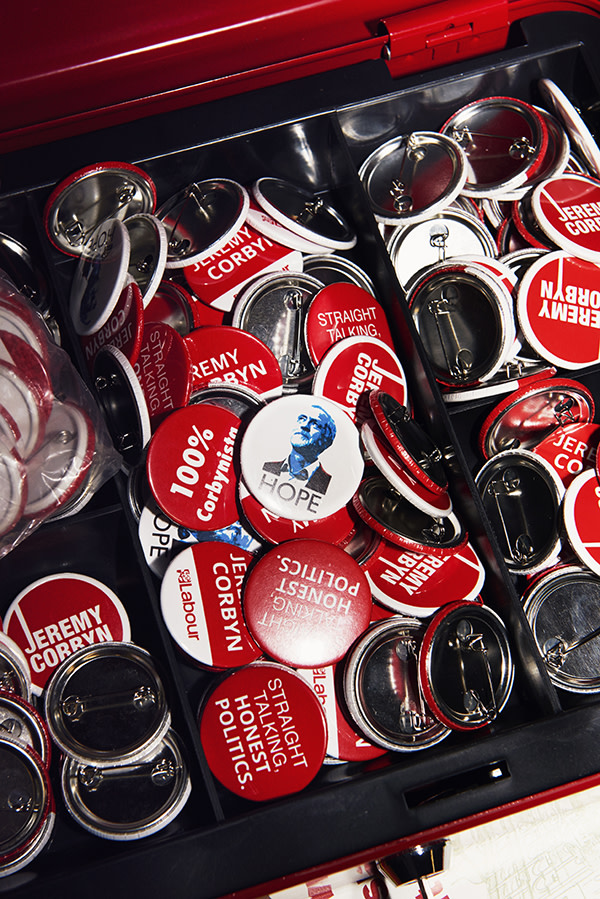
At the same time, Corbyn has — at least on one level — beaten the populists at their own game. Under his leadership, Labour’s membership has ballooned to 515,000. This is more than all Britain’s other parties put together. In a country where political rallies have largely been seen as vulgar Americanisms, some 75,000 people have come to watch him speak during the summer leadership campaign. His telegenic challenger, Owen Smith, can barely fill a large room.
Newham, the venue for Corbyn’s rally, was the first constituency to elect a Labour MP, Keir Hardie, in 1892. Today, the party’s leader wins a rapturous response. “It’s made me want to engage in a way that I haven’t since I was in my teens,” says one convert, Carolyn Corben, who would support the Green party were it not for Corbyn. “Commentators say he’s unelectable. None of them are psychic. [They say] he’s not a leader. Literally, he is the leader.”
But Labour’s recent history makes Corbynistas uncomfortable. When the names of the party’s past four leaders are mentioned at the rally, only one — John Smith — is mildly cheered. Two are greeted with silence, and one, Tony Blair, is booed, despite having won three general elections. “We are the Labour party!” Sam Tarry, a councillor and the manager of Corbyn’s campaign, tells the audience. “No longer do we want a party that is run by spivs and spinners in the corporate interest.”
This structural impasse between Labour MPs and members is almost unprecedented in British politics. “You can’t have a political party that is alienated from the party members to such a degree,” says Sir Malcolm Rifkind, former Tory foreign secretary.
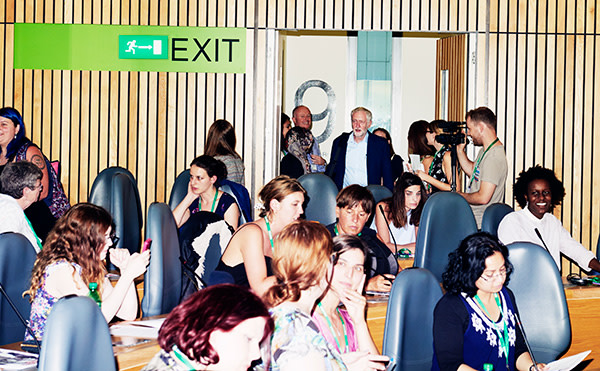
The moment of reckoning is now approaching. Next weekend Corbyn will travel to Liverpool for Labour’s annual conference, where he is expected to be announced as the winner of the leadership ballot. Victory would mark the death throes of the centrist New Labour, which governed the UK for 13 years. It would arguably give Corbyn the mandate to shape the party into a radical, anti-capitalist group — overhauling parts of the machine that he doesn’t yet control.
It would also mean that Corbyn’s opponents within the Labour party — including MPs and party donors — will face a dilemma. Should they back the leader, respecting the will of party members, or prolong Labour’s civil war? So far they have underestimated Corbyn’s tenacity, his determination to hang on despite losing his colleagues’ confidence. After conference, some MPs will reluctantly agree to serve under him. Others may refuse to leave the backbenches, risking deselection. Future leadership challenges are already being discussed. The mood among moderates in Liverpool will be grim. “It’s going to be like the morgue,” says one.
Rifkind has started to pity his old opponents: “I feel sorry for them, it is awful, it is existential.” Other Tories, however, cannot believe their luck. Theresa May, the new prime minister, has only a slender majority, but her main rivals are struggling to provide any semblance of united opposition. Polls suggest Labour could win as few as 153 seats in the next election, worse than in its previous lurch leftward in the 1980s. “The purity of perpetual protest offers only the road to electoral annihilation,” warns Dan Jarvis, another centrist MP.
Neil Kinnock, who led Labour out of its last “tilt to the left”, says he is furious about the party’s new direction. “My anger prevents me from feeling despair,” he says. How did Labour end up at this crisis point, and where should it go next?
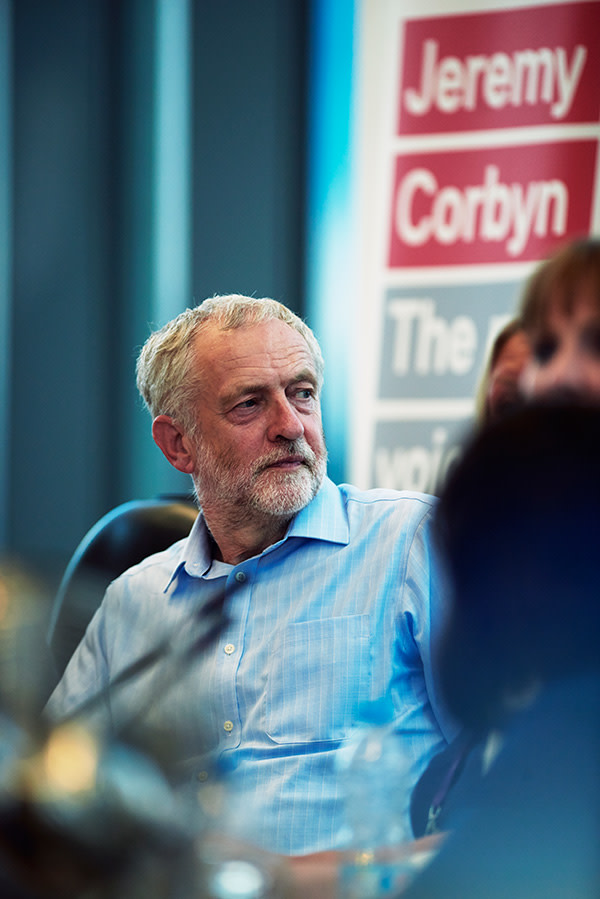
. . .
When Corbyn was elected a year ago, it was a fairy tale for Britain’s marginalised hard left. He had whimsically entered the contest to replace Ed Miliband at odds of 100 to 1. “It’s like a dream,” one adviser told the FT, while awaiting the result. “It’s the moment that Cinderella comes to the ball, but part of me feels like it won’t be long before the carriage turns back into a pumpkin and the wheels fall off.”
A former acolyte of Tony Benn, Corbyn had spent 32 years as a backbench MP for Islington North. His life had been an unending protest: according to one account, he spent the birth of one of his sons at a union meeting in the hospital basement. In the Blair years, he rebelled no fewer than 428 times in parliament — a habit that could have justified his expulsion from the parliamentary party, according to Hilary Armstrong, former chief whip.
Once in power, though, his lack of management skills became quickly apparent. “Jeremy hasn’t ever really led anything. He’s used to sitting in a small room talking about Nicaraguan peasants’ co-operatives while everyone nods,” a senior ally said at the time.
A crunch point came in early December when MPs debated bombing jihadis in Syria. Corbyn, a former chair of the Stop the War Coalition, offered his party a free vote but then failed to stop his allies abusing dissenting MPs online. There were further problems: Corbyn’s shadow cabinet reshuffle in January lasted three days; his performances at prime minister’s questions were indifferent; he seemed slow to crack down on anti-Semitic comments by some members.
Europe finally gave his critics the pretext they needed. By dusk on the day of the Brexit vote, the coup was in train. Within a few days, more than 60 shadow ministers had resigned and 172 had signed the no-confidence motion. Days later, at their weekly meeting, furious MPs shouted down Corbyn. Outside in Parliament Square leftwing activists waved banners and condemned “traitor” MPs. Throughout, Corbyn maintained a Zen-like calm, telling friends: “I don’t have the right to resign.”
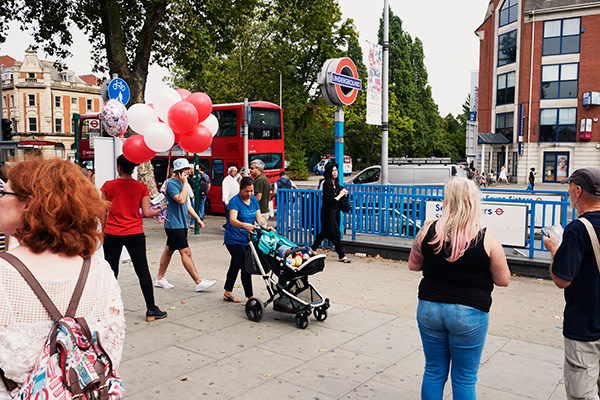
Corbyn’s belief stemmed from the “one member, one vote” system for directly electing Labour’s leader that Ed Miliband introduced in 2014. It reduced the power of MPs, and allowed anyone to vote if they endorsed “Labour values” and paid a small fee to become a registered supporter. When Miliband stepped down in 2015, the fee was £3. Radical outsiders turned to Facebook to organise. More than 100,000 people signed up — and 84 per cent of them voted for Corbyn.
Many of those new “Corbynistas” were channelled into a new supporter movement, Momentum, founded last year four weeks after Corbyn became leader. MPs, who are regularly bombarded with critical messages by Momentum members, tend to loathe the group. One moderate Labour MP derides Corbynmania as a far-left “virus”, infecting large numbers of young, mostly urban leftwingers. “In the past you’ve seen small groups come in — the Thatcherites in the Tory party or the hard left in the 1980s Labour party,” says Paul Richards, a Blairite commentator. “But we have never had an incoming group in the ascendant in quite the same way as this.”
Having more than doubled in a year, the Labour party membership is now almost unrecognisable from the Blair era. A fifth of new members are thought to have voted Green last year. “The membership used to be the bridgehead into the electorate’s views, but now ours has become a reflective shield around the leader,” says Frank Field, the moderate Labour MP.
Across Europe, traditional leftwing parties have struggled to respond to stalling wages, debt crises and the uncertainties of globalisation. Many voters have been seduced by the identity politics of populist insurgents such as Syriza in Greece, Podemos in Spain and the Front National in France. And while Corbyn’s politics are completely different to those of Nigel Farage, former leader of the UK Independence party (Ukip), both are utterly uncompromising figures.
“In America people have gone for Trump or Sanders. Here in the UK we have had a similar thing,” says Len McCluskey, general secretary of the union Unite, which has backed Corbyn financially. “People have been drawn to Alex Salmond, Nigel Farage, people who have conviction.”
One volunteer, Mumtaz Khan, says that the Labour party in his north London ward, Fortis Green, has grown enormously due to Corbyn’s leadership: “We used to have 150 members, now it’s more than 500. The meetings were six people around a coffee table. Now it’s 50 people and we can’t find a space big enough.”
For many of these grassroots supporters, Corbyn has yet to fail. After all, they argue, he was elected only a year ago and is returning the party to its roots. Labour has opposed cuts to benefits, and now advocates renationalising the railways and ending tuition fees. “We lost our way a bit over the last 20 years or so,” says Chris Williamson, a friend of Corbyn and a former MP. Blair himself appears to be in mourning for the pragmatic centre left: “It’s a very open question whether the type of politics I represent really has had its day or not,” he said this summer.
Such divisions in the Labour party mean that relations between Corbynistas and anti-Corbynistas have become so fractious that most local party meetings have been halted until after the leadership election. Marcus Roberts, international projects director for pollsters YouGov, says the MPs’ rebellion inadvertently bolstered Corbyn.
“You could say it was a mistake to put that pressure on Corbyn, because it made the clicktivists engage once again in a way they wouldn’t have done if the leadership had been a dull failure,” Roberts observes. Since the coup, membership of Momentum has soared; it now has 18,000 paying members and many more supporters. The only poll to date puts Corbyn ahead of his challenger Smith by 62 to 38 per cent.
Frank Field says that the rebellion was too swift: “I don’t think anyone in the country thinks it is fair that he wasn’t given at least two years to try to make it work.”
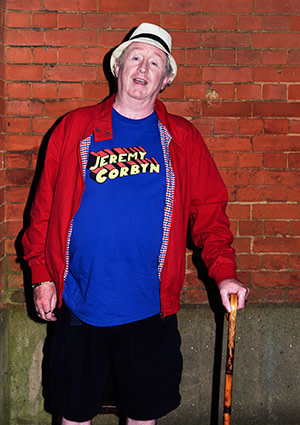
In the absence of other, more experienced heavy-hitters, Smith ended up as the single leadership challenger. Some former Blairite ministers, such as Alan Milburn and James Purnell, had left politics after clashes with Gordon Brown, while others such as Ed Balls and Jim Murphy lost their seats last year. Of the current generation, Dan Jarvis, Chuka Umunna and Yvette Cooper considered running but kept their heads down instead.
Smith has sought to maximise his support by breaking with the Blair years. A relatively new MP, he was not in Parliament when Labour backed the Iraq invasion. He has opted against challenging Corbyn’s radicalism, instead targeting the leader’s perceived incompetence and lack of precise policies. “We need to go beyond some of the slogans that Jeremy has been so good at articulating and get to some of the solutions,” he said at the outset of his campaign in July. He has since detailed plans for tax rises for the rich, wage councils and a public-sector pay rise. “Owen seems to be trying to outmanoeuvre Jeremy from the left,” says Barry Gardiner, a Corbyn loyalist MP.
About 130,000 new members who joined after January have been stopped from voting in the leadership contest unless they become registered supporters at a cost of £25. Another 50,000 registered supporters have been blocked by officials on various pretexts.
Meanwhile anti-Corbyn activists have begun to mobilise. Alan Fletcher, a pensioner, has always voted Labour but only joined the party this year to vote against Corbyn. “I’m 65 years old and I might never see another Labour government. I’m thinking the Tories are going to be in for the rest of my life,” he says.
“Jeremy Corbyn is like Chris Evans on Top Gear — a year is enough,” says Toby Morrison, a 25-year old charity-shop worker who voted for Corbyn last year.
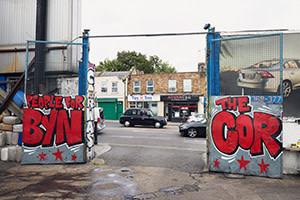
But it is hard to fight against Momentum. Corbyn’s campaign has dealt deftly with the challenge, painting Smith as a Trojan horse for the Labour right and claiming that his lobbying past would put the NHS at risk. Unlike Corbyn, Smith cannot point to decades of protest. “When I worked with him I always presumed he was New Labour,” says a former colleague from Smith’s time as a lobbyist for Pfizer.
In the two months of campaigning, support for Corbyn has been more vocal, visible and visceral. “The turnout at rallies has been even bigger than last year,” says Manuel Cortes, general secretary of the TSSA rail union, who claims that 7,000 people came to one event in Liverpool. “Owen is doomed because he is trying to be Corbyn-lite,” says a moderate Labour MP. “No one will even remember him in a few weeks,” adds a Corbyn ally.
. . .
If all of this is true, then the second coming of Jeremy Corbyn is now only days away. Still, the mood has changed from his election a year ago. Many longstanding activists — on both sides — complain of bullying, stress and even depression. “It’s moved from comedy to tragedy, sadly,” says Ayesha Hazarika, a former Labour aide.
Politicians heading into the annual conference are consoling themselves with glimmers of gallows humour: “I’m taking a poncho for all the spit,” says one MP. Paddy Ashdown, former leader of the Liberal Democrats, says it must be “bloody frightening” for Labour MPs. “They are like prisoners in Beethoven’s opera Fidelio, emerging from the dungeon but still in prison.”
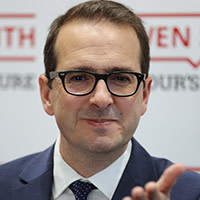
In a sign of the party’s divisions, some Corbynistas will avoid the main conference on the Mersey waterfront. Instead they will flock to a Momentum event in the city centre hosting sessions such as “Making the Left Sexy” and “Corbyn: Tackling Media Bias”. (The pro-Corbyn website The Canary now claims more web traffic than the New Statesman or The Economist.)
Corbyn’s supporters believe that if only the party would present a united front behind him it has a reasonable chance of winning a general election — despite having lost most of Scotland to the SNP. They argue that New Labour wouldn’t win either at the moment, that renewal is a long-term project and that Corbyn can defy convention. “We have people on every street who can explain the policies. We don’t need the press,” says Khan.
And yet critics note that support for Corbyn is concentrated in big, liberal cities such as London and Manchester. They fear that his pro-immigration, anti-wealth, free-spending policies will bomb in Britain’s small-c conservative heartlands. In a recent YouGov poll only 19 per cent of the public said Corbyn would make a better prime minister than Theresa May. For her part, May holds Corbyn in disdain, saying she hopes he will stay leader as long as possible.
Should Corbyn ever lead Labour into a general election, the Tories have an attack dossier at the ready, aimed at striking alarm into floating voters. It will remind people of Corbyn’s sympathy for the IRA’s armed struggle, his calling Hamas “friends”, his opposition to the monarchy, his inclination to hand back the Falkland Islands — even his description of Osama bin Laden’s death as a “tragedy”.
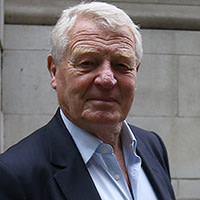
YouGov’s Roberts, himself a former Labour strategist, says voters quickly formed the view that Corbyn was not “prime ministerial” last summer. “That Tory attack dossier, when it comes, will confirm people’s view that they have already formed.”
For now though, if Corbyn does remain leader, Labour faces more imminent problems. The party still lacks a full shadow cabinet, with several figures filling multiple positions. “It is like fog. It will all clear up once the leadership is decided,” says Cortes of the TSSA union. Many rebels have privately signalled they will return to shadow portfolios if Corbyn wins. “I do not see what the other options are. At the end of the day, we have to fulfil our role, which is providing opposition to the Tory government,” says one.
But others, such as Owen Smith and Ed Miliband, will again refuse to serve, leaving holes in the front benches. Some newspaper columnists have called for Labour to split as it did in 1981. One much-talked-about scenario is a pro-EU, centrist party, embracing Blairites, Liberal Democrats and “Tory wets”. Yet the premise is questionable. More than nine in 10 Labour MPs voted to stay in the EU, but their constituencies mostly voted Leave.
Ashdown admits that the entire centre left is in trouble. “We’re fractured, broken, splintered — it’s not 1997 anymore,” he says. “With Labour it does not matter who is the leader, Labour cannot win a general election for the foreseeable future, perhaps forever, by themselves — because of the rise of Ukip and the SNP, they have no option but to work with us.”
This is difficult when most Labour MPs are tribal to their fingertips. “There is a really strong, spiritual if you like, affinity to the Labour party and Labour movement — this isn’t sentimental, it’s fundamental,” says Kinnock. “People who disagree with Jeremy are not going to leave the Labour party to people like him.”
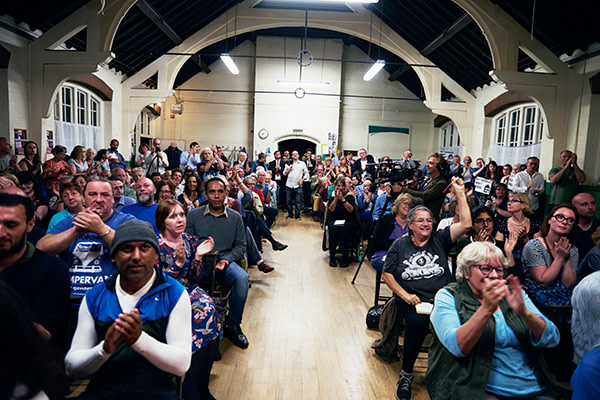
Historically, new parties have struggled spectacularly under Britain’s first-past-the-post electoral system. Of the 28 Labour MPs who quit to join the Social Democratic party in 1981 only six returned to parliament two years later. Ukip may have helped to deliver Brexit, but it only has one MP. “We would be slaughtered,” says Field of a potential split. “We’ll probably be slaughtered anyway, but at least we would still be buttressed by the first-past-the-post system.”
Moderate MPs have floated some tactical alternatives: picking a new leader for the parliamentary party to sideline Corbyn; joining the interlinked Co-operative party; or passing a motion at conference bringing back elections to the shadow cabinet. There will also be an attempt to reintroduce the electoral college for future party leaders. But no proposal solves the stand-off between MPs and the new grassroots.
John McTernan, a former Blair aide, believes that pragmatic unions could tilt the balance of power away from Corbyn, for example by blocking policies such as unilateral disarmament through their 50 per cent vote at annual conference. “The industrial wing of the Labour movement requires a parliamentary wing, and that could still turn out to be the stone in the shoe for Jeremy Corbyn,” he says. Another hope is that if Corbyn did ever quit in favour of an equally leftwing successor — say Diane Abbott, John McDonnell or newcomer Clive Lewis — it could break his personal spell over the grassroots.
One moderate Labour MP says the fight will not end with Corbyn’s re-election: “This is an engagement within a battle within a war.” Some are already discussing when to launch the next leadership challenge: Corbyn himself used to be a fan of annual contests. “The only way to do this is to have a charismatic candidate who can bring in new members from outside the bubble,” says one former shadow cabinet member.

But — with victory in the offing — the leader’s office is already planning its revenge. It intends to reshape the party further in Corbyn’s image, particularly if he wins more than the 59.5 per cent of the vote that he achieved last year. In July the leader warned of a “full and open selection process” to choose the Labour candidate in every seat for the next general election. Boundary changes in 2018 provide a golden opportunity to eliminate dissidents, and Corbyn plans to widen the membership of the ruling “national executive committee” to dilute its moderate members. His allies are also pushing for a new rule for leadership contests so that only 5 per cent of MPs’ support is needed — down from the current 15 per cent.
Amid all this manoeuvring it may prove hard to focus on the ostensible purpose of political parties: winning elections. “It is a truism of politics that divided parties do not win elections,” says Roberts. “There is also a truism, however, that parties with deeply unpopular leaders such as Corbyn don’t win elections either.”
Paul Richards, the Blairite commentator, predicts many slow years of “attrition” between the party’s two flanks. “Eventually, the bitter shock of defeat after defeat will start to focus minds. That’s what happened in the 1980s. It may be a 10- to 15-year project,” he says.
Corbyn will be 70 by 2020, the date of the next scheduled election. If he wins then, he would be the oldest person ever to become prime minister for the first time. He has suggested that he might not quit as Labour leader, even if he loses a general election. He has also said he will never retire, just like his father, an engineer. At a recent campaign event in Euston, he modestly says he is just “a repository of an awful lot of people… who want opportunities for everyone”. Later he smiles as he declares, “This genie is not going back in the bottle.”
Jim Pickard is the FT’s chief political correspondent. Henry Mance is an FT political correspondent
Photographs: Benjamin McMahon; Getty Images
Comments